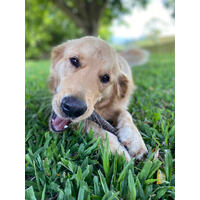National Pet Dental Health Month
Author: Cassandra Date Posted:1 August 2023

We have officially entered National Pet Dental Health Month! This month holds a special significance for our fur friends. Just like us, dental hygiene is essential to your pet’s overall health and can directly affect their quality of life. Below, we have provided some insight regarding the importance of dental hygeine in our fur companions, and tips to maintain your friend's pearly whites.
Why Is Pet Dental Health Important?
Just like humans, pest can suffer from dental issues, and without routine dental care and attention, bacteria can build up in the mouth, leading to plaque and tartar. Dental issues in pets can also lead to difficulty eating, bacterial infections, and even contribute to systemic diseases impacting their heart, liver, and kidneys.
Tips for Pet Dental Care:
1. Dental Check-ups We know that some pets feel the same way about vets as some humans do about the dentist. However, despite your friend's potential fear, it is important to scheule regular visits with your vetenarian for a general clean, and check-up on your pet's teeth, detecting any potential issues before they spiral out of control.
2. Brushing Yep, you bet, pets benefit from regular brushing too! Make sure to invest in some pet-friendly tooth brushes and toothpaste, as human toothpaste and other dental products could be harmful if ingested by your fur-friend. If your pet doesn't enjoy this process, there are always pet-friendly dental care products that don't require any brushing.
3. Dental Treats and Chew Toys There are a wide variety of chew toys and treats, all specially designed to promote oral health in your pet. In addition to being a fabulous form of dental care for your pet, they can also be a fun addition to your pet's day.
4. Appropriate Diet Ensuring that your pet is consuming a balanced diet with dental benefits can make a significant difference to their overall dental health. There are foods specifically designed for dental care, however this isn't always necessary and we suggest consulting your vetenarian for any diet alterations or recommendations.
5. Monitor Dental Health Inspect your pet's teeth often, looking for any signs of redness, swelling or unusual legions. If you do happen to notice anything concerning, make sure to contact your vetenarian with any concerns.
As pet owners, we want to care for our fur friend, ensuring they remain in good health, encouraging a long and fulfilling life. The tips provided above will assist in ensuring your pet's dental health is cared for, and minimise the risks of any nasty dental issues in the future.
Thanks for reading and happy brushing!

 for Dog Products & Supplies
for Dog Products & Supplies
 for Dog Food
for Dog Food
 for Cat Products & Supplies
for Cat Products & Supplies
 for Cat Food
for Cat Food
 for Reptiles
for Reptiles
 for Small Animals
for Small Animals
 for Aquarium
for Aquarium
 for Bird Products & Supplies
for Bird Products & Supplies
